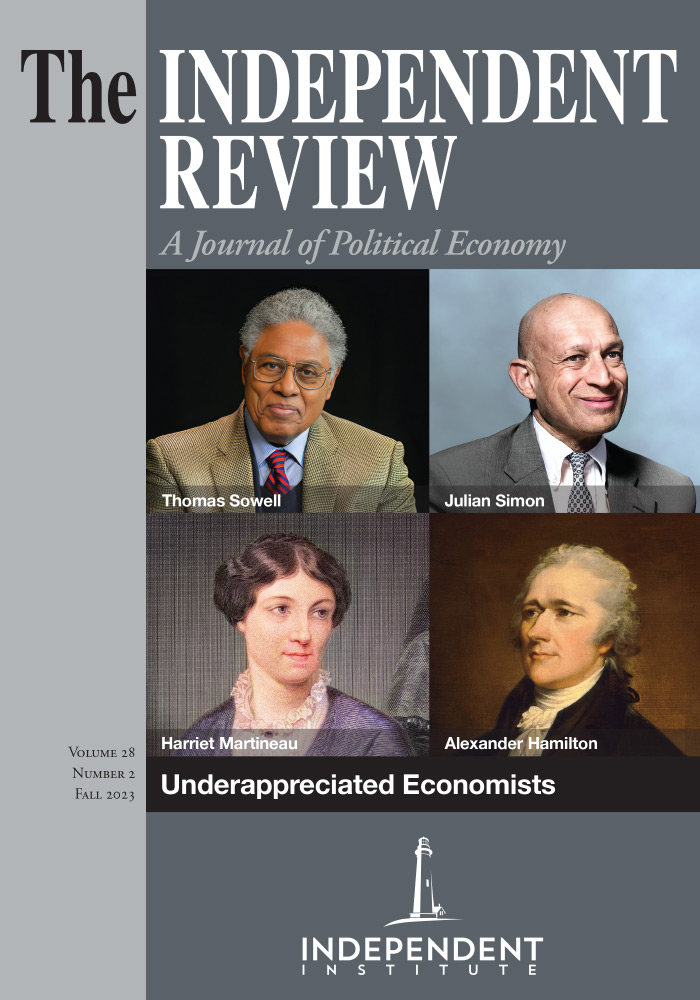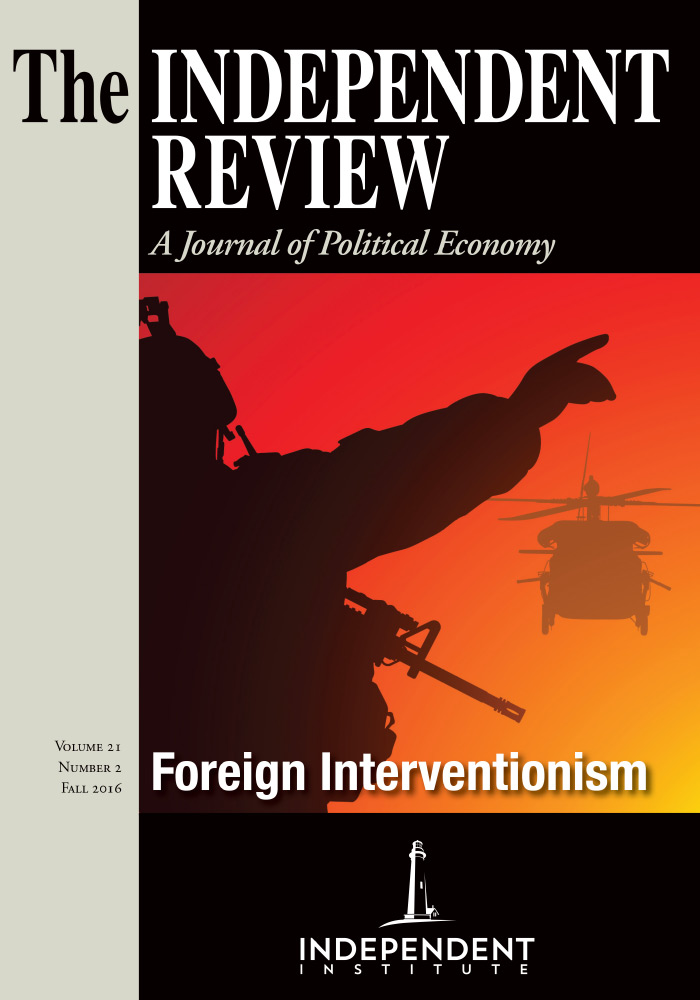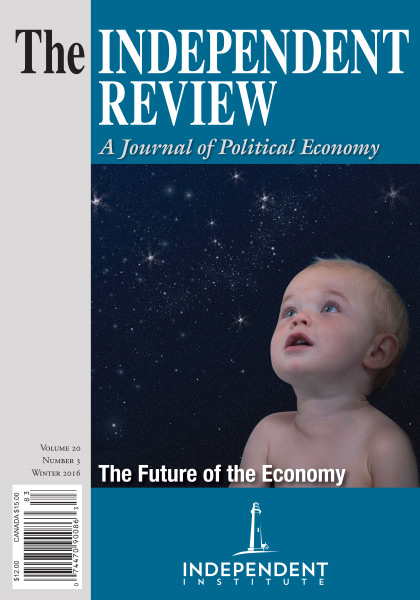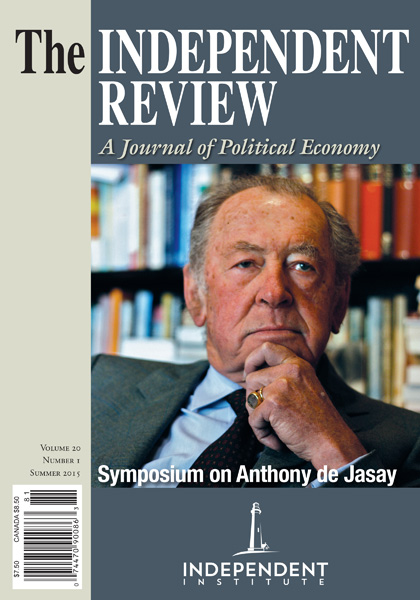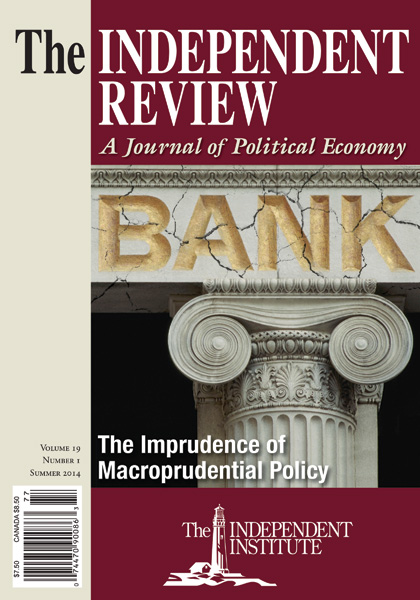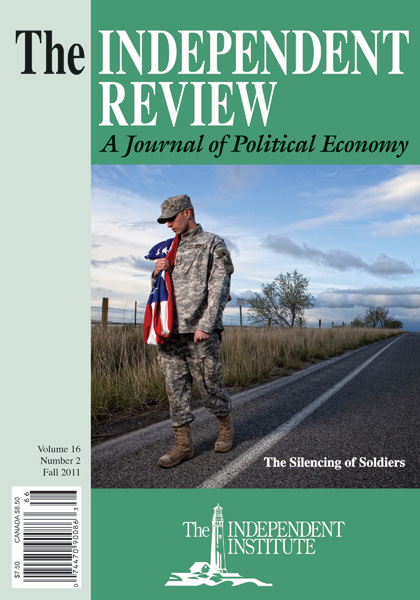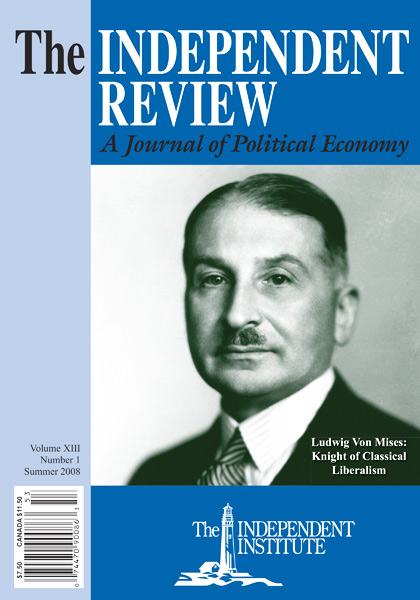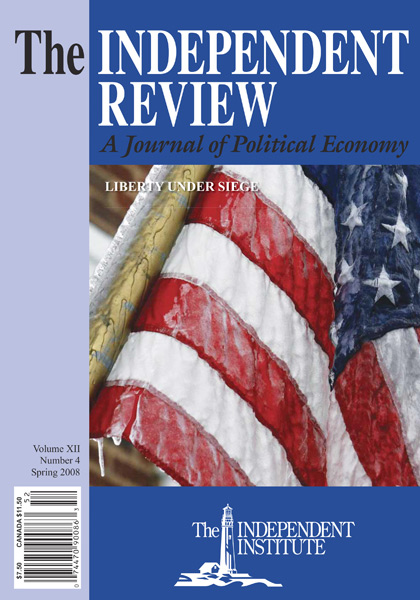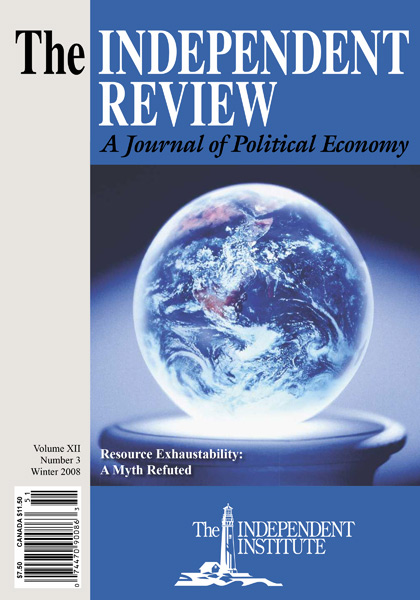This paper was selected by the editors as the winner of the 2023 Independent Review Student Essay Contest, which was funded by a grant from the Pope Foundation.
Adam Smith drew heavily from Greco-Roman tradition, especially the Stoic Cicero, in his emphasis on the practical application of philosophy. A comparative analysis of Smith’s Theory of Moral Sentiments and Cicero’s De Officiis reveals that Smith’s moral philosophy follows Cicero’s emphasis on the importance of practical application over contemplation for the harmony of society and the bettering of men’s souls.
Article
Although he is most often regarded as the father of modern economics, Adam Smith’s first work was on moral philosophy. Published in 1759, The Theory of Moral Sentiments centers on the theme of human interaction in society, specifically on what actions produce social harmony. As an Enlightenment thinker, Smith was heavily influenced by contemporary authors such as David Hume and Francis Hutcheson, as well as by earlier authors such as Aristotle and Cicero. Among modern scholars, there is a common consensus that Adam Smith drew heavily from Stoic philosophy, and Smith himself often made explicit references to the Stoics (Weinstein, n.d.). One important ancient Stoic work that was heavily read during the Enlightenment period is Marcus Tullius Cicero’s De Officiis (Kries 2003). Written in 44 B.C., this piece is an in-depth discussion on the duties of a good citizen written in the form of a letter to his son (Small 2013). Although they are separated by hundreds of years, there are many similarities between the works of Smith and Cicero; thus it is reasonable to assume that Adam Smith was very familiar with Cicero’s writing. A comparison of The Theory of Moral Sentiments and De Officiis clearly shows that Smith drew heavily from Greco-Roman tradition in his emphasis on the practical application of philosophy. Smith and Cicero each advocate for the importance of practicing virtue in friendships and in other aspects of society. They both argue that action, not just contemplation, is key to the prosperity of the community and virtue in the soul.
Before launching into his discussion of how to be a good citizen, Cicero begins his letter by laying a foundation of understanding. He makes two key claims in part one of his work, one of them being that men are designed by nature to live in a society. The second is that this desire for community stems from the elevated nature of the human soul, which is bent toward virtue. This capability of the human soul is what distinguishes men from beasts (Cicero 2000, 97). Thus, virtue is foundational to human nature and foundational to human society as well. In order to aid his audience’s understanding, Cicero first briefly discusses four key virtues; he then transitions his focus for the remainder of his work onto the application of these virtues. He defines these four cardinal virtues as wisdom, justice, beneficence, and courage (8–12). After acknowledging the importance of each, he stresses that the most important virtue underlying all others is decorum, which he defines as the “fitting” application of these virtues in action. In elaborating on this concept, Cicero stresses the importance of action, not just contemplation, as most relevant. Cicero believes that contemplation of virtues, the things that are good in and of themselves, is important for the soul; however, he also believes that without the proper application of these ideals, they are essentially worthless, both to the individual soul and to the community as a whole (34). He treats social harmony in society as a reflection of the state of men’s souls, and thus focuses this work on the intermediates, or applications of virtue, to strengthen the community (Kries 2003, 385). He argues that for society to function, there must be cooperation among citizens, and therefore human action must be rooted in virtues. Cicero also uses the terms prudentia (discretion) and sapientia (wisdom) to distinguish between virtue in a contemplative sense versus a practical sense (Small 2013, 342). He encourages his audience to be “concerned with the fellowship of the human race” (Cicero 2000, 52), and emphasizes the obligation citizens have to do what is fitting, rather than simply reaching the ultimate understanding or definition of what wisdom means (48).
Following Cicero’s example, Smith distinguishes between virtue in universal terms and virtue in action. In book one of his Theory of Moral Sentiments, Smith begins by discussing living in a community with others and how this can only function due to a sense of propriety, which the Cambridge Dictionary defines as “correct moral behavior or actions.” Like Cicero, Smith does not want to get caught up in the lofty philosophical concepts; rather, he wants to discuss how society can best function given the consequences that follow men’s actions. Smith still mentions important virtues, including justice, beneficence, and magnanimity; however, he repeats an idea similar to Cicero’s: that achievement of these virtues is founded on “self-denial, of self-government, of that command of the passions” (Smith 1982, 18). Similar to Cicero, Smith argues that the human will must balance its desires in order for the proper application of virtue. Like the Stoics, he recognizes the absolute virtues, but chooses to focus on how men’s actions can seek to align with them (Furuya 2011, 80).
After establishing the importance of applying virtue for the sake of community, both Smith and Cicero describe the relationships and friendships that result from such actions. In addition to the concept of propriety, Smith also emphasizes the role of sympathy in promoting harmonious relations. Sympathy is not the same as pity. Rather it is the idea of putting oneself into the shoes of another, in order to understand their perspective better (Waszek 1984). Smith argues that this is practical because it doesn’t require a perfect understanding of virtue to achieve or stipulate that individuals become best friends. Instead, it establishes a mutual understanding of respect on a basic human level. In fact, Smith argues we often use this method of seeing from another’s eyes to judge our own conduct. This ties into his idea of the “impartial spectator.” Drawn from his ideas on both propriety and sympathy, the impartial spectator is the idea that individuals view themselves as both the judge and the participant (Weinstein, n.d.). This allows men to judge their actions with a better perspective and ensure that selfish desires do not go beyond the proper amount, and it connects men to their companions through the sympathetic aspect of seeing themselves from another point of view (Hill and McCarthy 2004). Cicero also briefly discusses a similar idea when he discusses the importance of pursuing justice within the community. He argues that men ought to consider how they would want to be treated when treating with others, and he even goes so far as to claim that disregard for others’ opinions is a sign of “conceit but also lack of integrity” (Cicero 2000, 34). This concept is commonly known as the golden rule and serves as an integral part of cooperation between men.
Smith also distinguishes between two types of relationships within the community: voluntary, warm friendships and necessary, cool friendships. He argues that voluntary friendships are those true and sincere friendships that are accompanied by strong emotional attachment. They also have a strong connection to the virtue of beneficence, in that men enjoy helping those they care most about (Hill and McCarthy 2004, 7). These relationships are desirable for their own sake, not for their utility (9). However, he also warns that such relations have the potential to be more volatile and “clan-based,” which can alienate others in the community (2). In contrast, the necessary relationships are based on the “necessity or conveniency of mutual accommodation” (Smith 1982, 224). In describing these necessary friendships, Smith directly cites the Latin term necessitudo, which conveys the idea of a close relationship but also a need (224). Thus, this type of friendship is not done simply as an end in itself, but with a goal or need in mind (Hill and McCarthy 2004, 3). He concludes that warm friendships are a luxury and perk of living in a community; however, he also recognizes that the necessary relations are most critical for the preservation and success of the community (Smith 1982, 224). Smith also claims that this mutual respect will allow for harmony among international communities, and this attitude of cool friendship toward foreign neighbors can allow for trade.
Similarly, book one of De Officiis analyzes different types of relationships among men, ranging from familial bonds, close friends, and relationships with a power gap (Cicero 2000, 20). A study of Cicero’s descriptions makes it increasingly clear where Smith drew inspiration for his discussion on the role of true friendship. Cicero argues that true friendship is an end in itself and can produce virtuous character: “None is more pre-eminent or enduring than the friendship forged between good men of like character” (20). Like Smith, he thinks this friendship is the metaphorical cherry on top of human relations in a community (21). He also states that friendships come with obligations, including the responsibility to share with them, repay them, and offer words of encouragement along with words of rebuke (Hill and McCarthy 2004, 9). Additionally, Cicero describes friendships that impose proper actions on individual behavior. Like Smith and his idea of the impartial spectator, Cicero also recognizes the effect that another perspective can have in shaping the actions of individuals. Both authors take the time to describe different interactions and relationships within the community because these are where virtue is applied on the individual scale. By interacting with and considering other individuals, men employ decorum and propriety, sympathy and beneficence. By participating in society, virtue is practiced, and society runs more smoothly.
Cicero and Smith’s emphasis on the practical application of virtue even extends to “economic” concepts. This is rooted in their similar belief regarding the imperfect nature of humanity, yet despite this flawed nature both emphasize the duties men have as members of society to strive after morality in order to benefit the community (Kries 2003, 384). As a Stoic, Cicero believes that men must determine the balance between these practical economic ideas and pursuing the highest virtues. For example, in book one, Cicero actually advocates for the important role that self-interest plays in society. He argues that the first and most natural instinct of all living things is self-preservation (Cicero 2000, 6). Similarly, this self-interested nature is seen in the creation of private property, which Cicero states must be protected by order and law for the sake of the community. Cicero argues that these are tools for the cultivation of justice within the community, because men must at times restrain their own desires and actions for the sake of the community (9).
Smith nearly copies Cicero exactly in the Theory of Moral Sentiments when he argues that men’s first priority is survival and self-interest (Furuya 2011, 87). He even explicitly references the Stoics in his description of human survival instincts in section two of that work. He then builds his philosophy on the idea that self-interest is a motivating factor for all human action. Like Cicero (2000, 46), who argues that self-interest must be restrained by the Stoic pursuit of living according to the mean, Smith also states that balanced self-interest can be a positive driving factor to society and the economy (Furuya 2011, 80). He goes so far as to advocate for “mediocrity” because that is where balance and propriety are best achieved (Smith 1982, 27).
Another example of self-interest that can be a tool for either virtue or vice is the concept of wealth. In De Officiis, Cicero states that wealth is not a good in and of itself: essentially, wealth is not an absolute virtue that men should strive for. However, Cicero does specify that gaining wealth and power in a just and moral manner one pursue virtue (Small 2013, 342). Similarly, he warns that if pursued in excess, wealth has the potential to corrupt and cause division (Furuya 2011, 80). Once again, Smith follows in the footsteps of Cicero and advocates for finding the balance between wealth and frugality. According to Smith (1982, 247), too much of either shows a lacking in the application of self-interest and propriety, which will have negative effects on the community as well. Both authors recognize that selfinterested motives can bring about harmony and virtuous results when under the influence of decorum, or propriety. Thus, self-interest is valuable for its utility in striving for virtue; however, it is not a virtue itself.
Another surprising application of Stoic philosophy in Smith’s Theory of Moral Sentiments is the foundation for what later became a big part of his work in economics, the idea of division of labor. In De Officiis, Cicero builds on his argument for the importance of men living in community and uses an analogy of a colony of bees. Cicero describes bees as “sociable by nature” and says they come together to apply knowledge and skills to action. This is another example of his emphasis on practical application over contemplation, and also demonstrates that each individual contributes by bringing their own skills and knowledge. He advocates for each to contribute and fulfill their obligation to the community; however, he also emphasizes that each one has different obligations. He argues that citizens ought to “work hardest at the things for which we are best suited” (Cicero 2000, 37). For example, he compares the duties of the old and young, and those in different professions and stations (42). Just as different relationships require different obligations, so do these different positions in life have their own duties as well.
This argument appears straightforward, but it played a key role in shaping the foundation of Adam Smith’s own thinking. Although Theory of Moral Sentiments isn’t known as his economic bestseller, it still was foundational to his economic thinking. Like Cicero, Smith recognizes the importance of different talents and skills among citizens to contribute to variety within society (Smith 1982, 170). This concept, which he begins to discuss in Theory of Moral Sentiments, is the foundation for one of his most notable contributions to the field of economics: the division of labor. Not only does dividing tasks and specializing make an economy more efficient, but on a philosophical level, this practical concept also causes people to be more interdependent and connected, which is a fulfillment of human nature according to the Stoic philosophy that Smith was drawing from (Hill and McCarthy 2004, 2).
Adam Smith drew inspiration from Greco-Roman tradition in his writings, and more specifically he often borrowed from Stoic thought. Like the Stoics, Smith recognized that men are by nature imperfect and yet are designed to live in a harmonious community and thus ought to pursue virtue in their actions and interactions. A comparative analysis of Smith’s Theory of Moral Sentiments and Cicero’s De Officiis reveals that Smith’s moral philosophy follows Cicero’s emphasis on the importance of practical application over contemplation for the harmony of society and the bettering of men’s souls. Both authors used their own term to describe the actions that people do in striving for virtue, with Cicero using decorum, and Smith using propriety; however, both terms refer to the same idea. Additionally, each author further examines the practical application of virtue through its role in different friendships and relationships within communities. Lastly, both Smith and Cicero describe the connection between this practical philosophy and the economic concepts of selfinterest and the division of labor. This significant amount of overlap between Cicero’s work and Smith’s work, published centuries later, further emphasizes the influence that the Stoics had on Smith’s writing and proves that Smith most certainly had Cicero’s De Officiis in mind when he wrote his own treatise on the functioning of men within society.
References
Cicero, Marcus Tullius. 2000. De Officiis [On Obligations]. Translated by P. G. Walsh. New York: Oxford University Press.
Furuya, Hiroyuki. 2011. Beauty as Independence: Stoic Philosophy and Adam Smith. Kyoto Economic Review 80 (1): 70–102.
Hawley, Michael C. 2019. Cicero’s Duties and Adam Smith’s Sentiments: How Smith Adapts Cicero’s Account of Self-Interest, Virtue, and Justice. History of European Ideas 45 (5): 705–20.
Hill, Lisa, and Peter McCarthy. 2004. On Friendship and Necessitudo in Adam Smith. History of the Human Sciences 7 (4): 1–16.
Kapust, Daniel J., and Michelle A. Schwarze. 2016. The Rhetoric of Sincerity: Cicero and Smith on Propriety and Political Context. American Political Science Review 110 (1):100–111.
Kries, Douglas. 2003. On the Intention of Cicero’s “De Officiis.” Review of Politics 65 (4): 375–93.
Small, Michael Willoughby. 2013. Business Practice, Ethics and the Philosophy of Morals in the Rome of Marcus Tullius Cicero. Journal of Business Ethics 115 (2): 341–50.
Smith, Adam. 1982. The Theory of Moral Sentiments. Edited by D. D. Raphael and A. L. Macfie. Indianapolis: Liberty Fund.
———. 1991. The Wealth of Nations. With an introduction by D. D. Raphael. New York: Alfred A. Knopf.
Waszek, Norbert. 1984. Two Concepts of Morality: A Distinction of Adam Smith’s Ethics and Its Stoic Origin. Journal of the History of Ideas 45 (4): 591–606.
Weinstein, Jack Russell. Adam Smith (1723–1790). Internet Encyclopedia of Philosophy. Accessed April 3, 2022.



